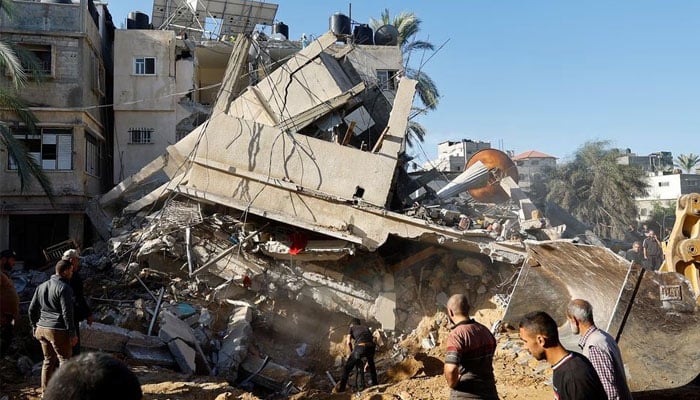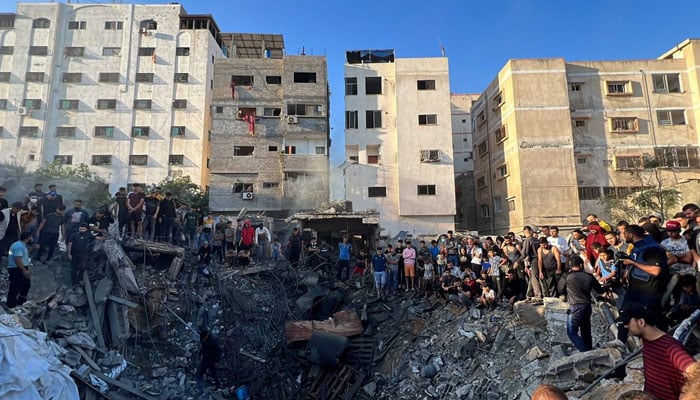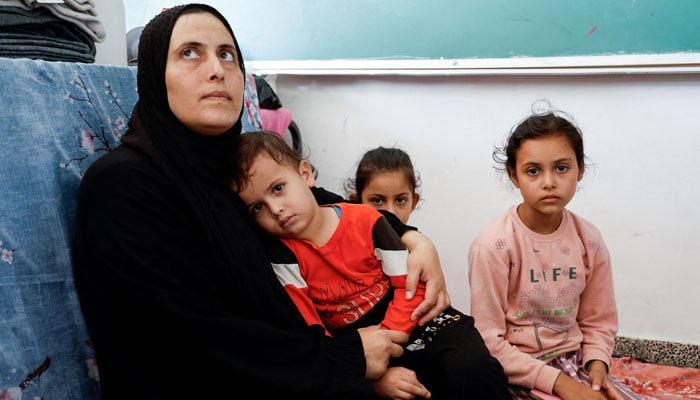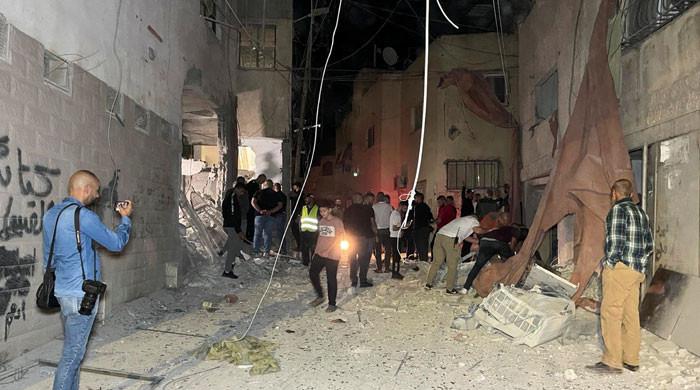- Israeli sources say targeted mosque associated with Jenin Brigade.
- Israeli bombing martyrs over 4,000 Palestinians mostly civilians.
- Palestinians in Jenin are being reintroduced to airborne terror.
Israeli forces targeted the Jenin refugee camp in the occupied West Bank after announcing intensifying airstrikes on Gaza ahead of a planned ground invasion.
The airstrike targeted a mosque associated with the Jenin Brigade, labeled an “underground terrorist group” by Israel, reported Al Jazeera on Sunday.
According to Israeli sources, the Al-Ansar mosque was associated with the Jenin Brigade, labelled an “underground terrorist group” by Israel and added that they were “neutralised”, without giving details on the number killed in the strike or their identities.
The director of the Red Crescent in Jenin, Mahmoud Al-Saadi, was quoted by the Palestinian news agency Wafa saying one person was martyred and three others injured in the strike.
Dozens of people have been martyred in the West Bank by Israeli troops or settlers since October 7, when Hamas fighters stormed into Israel and killed at least 1,400 people, most of them civilians, according to Israeli reports.
Meanwhile, Israel has launched heavy bombardment of the Gaza Strip in retaliation, which has martyred more than 4,000 Palestinians, mostly civilians including over 1,000 children, according to the Gaza health ministry.
According to Al Jazeera correspondent Sara Khairat, the air strike took residents “by surprise” but it appears there may still be more to come.
“Eyewitness spoke to us and said they saw an F-fighter jet in the sky, they heard it and then the Israeli army came out to confirm it was an air strike,” said Khairat live from Ramallah.
The mosque was the site of a two-day Israeli siege in July when Israeli forces found a network of tunnels and seized equipment, drones, and ammunition, she said.

Following the attack, some residents received text messages on their phones warning them to avoid collaborating with the Jenin Brigade, one of the largest and most popular groups in the West Bank.
The messages also said to keep children inside, Al Jazeera reported.
There are also unconfirmed reports of an Israeli officer calling residents and telling them to turn their “youngsters” over to the police by 7am.
Jenin, a Palestinian camp in Israel, has faced Israeli antagonisation since 2002, with incidents like the killing of Al Jazeera journalist Shireen Abu Akleh last year.
However, with Israel’s latest incursions, Palestinians in Jenin are being reintroduced to airborne terror in densely populated spaces, causing displacement of refugees already displaced in Gaza.
This highlights the ongoing Israeli antagonisation and the need for more effective strategies to address these issues.
US sends more air defence systems to Middle East
The US will send a Terminal High Altitude Area Defense (THAAD) system and additional Patriot air defence missile system battalions to the Middle East, the Pentagon said on Saturday, in response to recent attacks on US troops in the region.
The US has sent a significant amount of naval power to the Middle East in recent weeks, including two aircraft carriers, their support ships and about 2,000 Marines.
Washington is on heightened alert for activity by Iran-backed groups as regional tensions soar during the Israel-Hamas war, Reuters reported.
“Following detailed discussions with President (Joe) Biden on recent escalations by Iran and its proxy forces across the Middle East Region, today I directed a series of additional steps to further strengthen the Department of Defence posture in the region,” Defence Secretary Lloyd Austin said in a statement.
Austin said he was placing additional troops on prepare-to-deploy orders, but did not say how many. The Pentagon has already placed some 2,000 troops in a heightened state of readiness in case they need to deploy to the region.
“These steps will bolster regional deterrence efforts, increase force protection for US forces in the region, and assist in the defense of Israel,” Austin added.
The deployments come two years after Biden’s administration withdrew air defence systems from the Middle East, citing a reduction in tensions with Iran.
Israel vows to intensify strikes on Gaza
Israel has sieged the supply of food, water, fuel, and electricity, and the UN, quoting local authorities, claims that over 40% of all housing has been damaged or destroyed.
In order to reduce the risks to its soldiers when it launches a land assault, Israel will now step up its bombardment, according to military spokesman Admiral Daniel Hagari.
“From today, we are increasing the strikes and minimising the danger,” he said. “We will increase the attacks and therefore I called on Gaza City residents to continue moving south for their safety.”
Israel has warned more than one million residents of the northern part of Gaza to move south for their safety, and the UN says more than half the enclave’s population is now internally displaced.

Bombardment has continued in southern parts of the Strip though, with Hamas authorities reporting nine martyred in an airstrike in Khan Younis overnight.
Hundreds of thousands of civilians are believed to remain in and around Gaza City in the north, unwilling or unable to leave.
The conflict has raised fears of a broader regional war, and Washington said it would deploy defence batteries and additional Patriot battalions to protect US forces.
The Pentagon also said it was notifying additional troops to “prepare to deploy orders” without specifying how many or when they could be dispatched.

Qatar continues negotiations for hostage releases
Israeli troops have massed on the border with Gaza and commanders visited frontline units on Saturday to rally troops.
“We will enter Gaza,” Chief of Staff Lieutenant General Herzi Halevi told one infantry brigade on a visit. “Gaza is densely populated, the enemy is preparing a lot of things there — but we are also preparing for them,” Halevi said.
Israeli forces will face numerous obstacles during a ground invasion, including Hamas tunnels and booby traps in a crowded urban setting.
Another complicating element is the safety of the more than 200 captives that Hamas has captured.
Two American hostages were released on Friday evening, after mediation from Qatar, which said more could be freed “very soon.”
“We are taking a path that will very soon lead to the release of the hostages, especially civilians,” Qatari foreign ministry spokesman Majed Al-Ansari told the German Welt am Sonntag newspaper Saturday.
“We are currently working on an agreement under which all civilian hostages will be initially released,” he added.
After negotiations and US pressure, food, water and medicine, but no fuel, crossed from Egypt into Gaza on Saturday. The crossing closed afterwards, and UN officials warned much more was needed.
“Gaza was a desperate humanitarian situation before the most recent hostilities,” five UN agencies said in a statement. “It is now catastrophic. The world must do more.”
‘Something needs to be done’
UN Secretary-General Antonio Guterres called for a humanitarian ceasefire “to end this godawful nightmare” during a peace conference in Egypt.
Though the Arab attendees released their own statement denouncing international leaders, Western diplomats demanded a firm condemnation of Hamas, therefore the summit ended without a joint declaration.
Inside Gaza, shellshocked residents said they were unsure where to go or how to protect their families.
“Even in my worst nightmares, I never thought this could be possible,” said Rami Abu Wazna, staring at the destruction in central Gaza’s Al-Zahra neighbourhood.
The scale of the bombing has left basic systems unable to function, with the UN reporting around 40 unidentified bodies were buried in a mass grave in Gaza City on Saturday because cold storage ran out before they could be identified.
Across the border in Israel’s Kibbutz Beeri, where Hamas fighters killed 10 per cent of the population, preparations were underway for funerals on Sunday.
Romy Gold, 70, said residents were still struggling to comprehend the horror of their experience.
“Around us whole families were shot or butchered or burned alive,” he told AFP. Like many, he believes a ground invasion of Gaza “cannot come fast enough. Something needs to be done.”
“We need some kind of assurance that it will not happen again,” he said.

